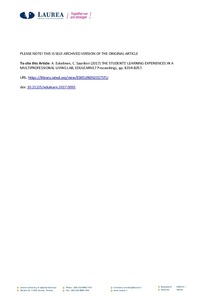The students' learning experiences in a multiprofessional Living Lab
Eskelinen, Anne; Saarikivi, Carita (2017)
Eskelinen, Anne
Saarikivi, Carita
International Academy of Technology, Education and Development
2017
Julkaisun pysyvä osoite on
https://urn.fi/URN:NBN:fi:amk-2017082414535
https://urn.fi/URN:NBN:fi:amk-2017082414535
Tiivistelmä
The purpose of this study was to explore the Bachelor Degree Programmes of Nursing and Social Services students’ learning experiences in a multiprofessional Living Lab. The aim was to offer for the students an experience to work with the mental health rehabilitees as a part of their studies in a Living Lab environment, which is a user-centered open innovation ecosystem integrating research and innovation in real life communities and settings. The Mental Health Living Lab setting was offered by Laurea University of Applied Sciences and the association of Keski-Uudenmaan Sopimuskoti Ry.
The data was collected in a feedback survey. The survey consisted of both qualitative and quantitative questions. The quantitative data was processed using SPSS Statistics and open questions were categorized.
Multiprofessional learning supported the students’ abilities in the fields of nursing and social services. The students got new experiences, knowledge and more capacity to work with professionals from other fields. The students also appreciated the opportunity to work with mental health rehabilitees and they got more confidence to meet and interact with the rehabilitees. It was important to hear about the experiences of rehabilitees to gain more professional skills to collaborate with clients in the future. The benefits of multiprofessional learning were wide-ranging and the students hoped to get more opportunities to work with multiprofessional projects during their studies.
The data was collected in a feedback survey. The survey consisted of both qualitative and quantitative questions. The quantitative data was processed using SPSS Statistics and open questions were categorized.
Multiprofessional learning supported the students’ abilities in the fields of nursing and social services. The students got new experiences, knowledge and more capacity to work with professionals from other fields. The students also appreciated the opportunity to work with mental health rehabilitees and they got more confidence to meet and interact with the rehabilitees. It was important to hear about the experiences of rehabilitees to gain more professional skills to collaborate with clients in the future. The benefits of multiprofessional learning were wide-ranging and the students hoped to get more opportunities to work with multiprofessional projects during their studies.
